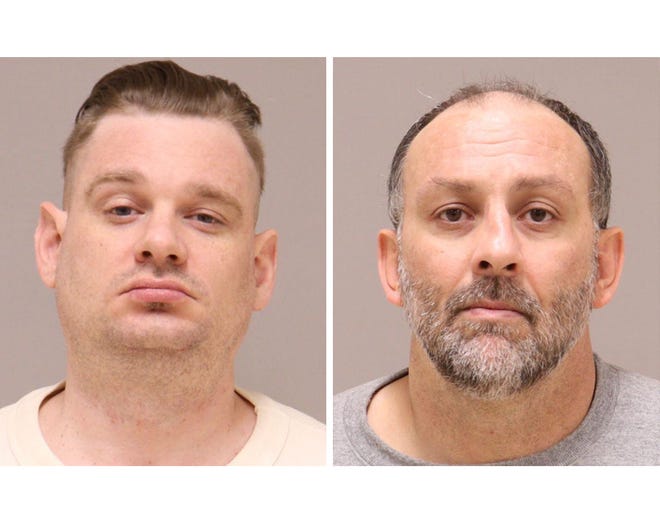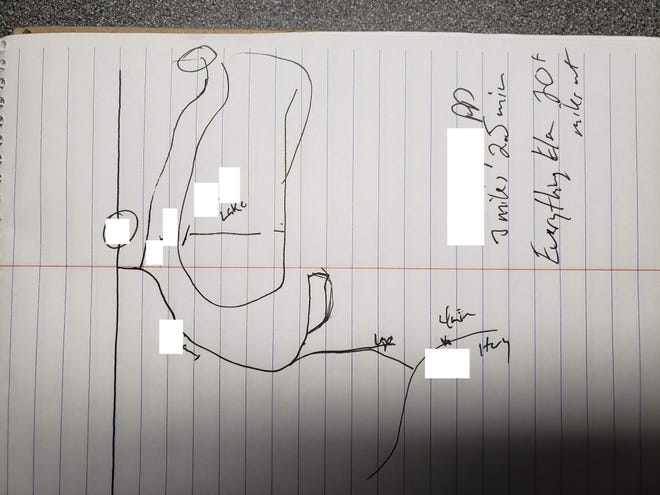The judge is getting impatient with the defense in the Gov. Gretchen Whitmer kidnapping retrial, telling lawyers they are taking too much time talking about “crap” that isn’t important, dragging out the case and exhausting jurors in the process.
“You can look at the jury and see when they are checking out — and they’re checking out,” U.S. District Judge Robert Jonker said after the jury went home Friday.
On day three of the trial, Jonker admonished defense lawyers both in front of the jury and in its absence for — as he saw it — taking too much time cross-examining the FBI agents testifying on behalf of the government. Some cross-examinations have lasted three hours.
Judge to consider enforcing time limits
“Start focusing on what the important issues are, before this trial stretches into Thanksgiving,” Jonker told one of the defense lawyers in front of the jurors.
The judge got testier after the jury went home.
“It’s getting ridiculous,” Jonker said of the time spent on cross-examinations, warning he is going to think “hard” over the weekend about enforcing time limits “unless the defendants can start focusing on something that really matters.”
At issue for the judge on Friday was the defense’s fixation on the many different and wild kidnapping plans that were allegedly discussed by the defendants, including one where Whitmer would be snatched from her Mackinac Island vacation home and flown away in a helicopter.
As in the last trial, Jonker has sought to limit questioning about the helicopter. During the first trial, he said that the government’s case is focused largely on an alleged plan to kidnap Whitmer from her cottage in Elk Rapids. The first trial in the case ended with two acquittals and the jury unable to reach a verdict on charges against Adam Fox and Barry Croft Jr. Fox and Croft are being retried in federal court in Grand Rapids. Two other men pleaded guilty before the first trial.
More:Juror’s daughter-in-law got high with kidnap defendant Fox near Whitmer cottage
More:Alleged rogue juror under investigation in Whitmer kidnap retrial
The defense has long argued it has a right to show the absurdity of the plans that were allegedly discussed as it maintains the defendants were merely tough-talking, unsophisticated potheads who were merely engaged in puffery and fantasy play.
Jonker told the defense lawyers he understands why they want to press certain issues. But he urged them not to muck up their arguments with “all this other crap.”
Three FBI agents have testified so far, each taking about an hour and a half to tell their version of events. But the defense lawyers are taking twice as much time during their cross-examinations, the judge noted, noting he has never before ordered time limits in a criminal case.
Jonker had brought up the idea of time limits in trials just before the noon break Friday, urging lawyers to trim the fat from their line of questioning and “sharpen” their focus.
“Think about it … you’ll have better presentations in my view,” Jonker said.

‘Let’s get it moving’
But after trial resumed, the cross-examining resumed — with the defense getting fixated on the details of what they viewed as ridiculous plans to kidnap the governor, such as abandoning her in a boat in Lake Michigan or flying her away in a helicopter.
Attorney Chris Gibbons, who is representing Fox, kept grilling an FBI agent about those details, though the FBI agent kept firing back with comments like, “that’s what they discussed.”
When Gibbons kept bringing up the helicopter story, the judge cut him off, and urged him to stick to details that matter.
At the end of the day Friday, Gibbons told the judge he believes the trial could be wrapped up by next Friday.
Jonker was skeptical.
“Everything is taking longer this time,” Jonker said. “You all know each others’ exhibits by now. Let’s get it moving.”
How to get off Mackinac Island with the kidnapped governor
Gibbons got under the judge’s skin when he kept grilling an FBI agent who had gone undercover in the militia about the group’s alleged plans to kidnap Whitmer, either by boat or helicopter, and whether the agent felt they could pull it off.
“I thought they had the intention to do something violent,” the FBI agent testified.
“I didn’t ask you that,” Gibbons said. “Did you walk away with the impression that these (defendants) had the capability to bring about the type of attack they were talking about?”
“Some of it yes, some of it no,” the FBI agent answered.
Then came a question about a Black Hawk helicopter. Gibbons asked the agent whether he thought the defendants had the ability to get access to such a helicopter.
The judge said move on.
The questioning turned to Mackinac Island, with the FBI agent saying Fox asked him to design a map to figure out a way to get to Whitmer’s summer vacation home on the island. Fox also asked him to conduct surveillance at the island, he said, adding Fox wanted to know how they could get on and off the island “once we’ve kidnapped her.”
Gibbons then brought up the chopper again, saying: “Part of the plan was to take Whitmer away by a Blackhawk helicopter?”
“That was one plan, yes,” the agent answered.
Gibbons then brought up another alleged plan that involved taking Whitmer by boat up the St. Lawrence Seaway.
The judge interjected again, saying the government’s point is going to be that there was a plan, where the defense is countering that “these were ridiculous plans.”
“Start focusing on what the important issues are, before this trial stretches into Thanksgiving,” Jonker said.
Gibbons moved on to questions about another alleged boat plan.
‘We’ve been over this’
The agent testified that Fox discussed stealing a boat, killing Whitmer’s security detail from the water, and then once the security detail was dead, stealing a car from the governor’s home and kidnapping Whitmer.
“Do you think he could have been high when he said these things?” Gibbons asked the agent.
“He could have been,” the agent answered.
Gibbons then asked about another alleged plan to use two boats to kidnap Whitmer. One would take the governor out to the lake, and abandon her there, with the motor dropped. The second would take the kidnappers back to shore.
“Would they steal these boats?” Gibbons asked.
“They discussed that,” the agent answered.
“Is it possible a helicopter was coming to take them away,” Gibbons asked.
The judge chimed in: “We’ve been over this.”
‘Adult make-believe’
Gibbons then switched the questioning to a main theme in the case: that the defendants were engaged in fantasy play.
“Do you understand what LARPing means?” Gibbons asked.
“It means live action role playing,” the agent answered.
Gibbons clarified: “That’s adult make-believe?”

The agent said Fox wasn’t make-believing when he discussed the kidnapping plan. Rather, he said, Fox said the group would engage in LARPing if they encountered law enforcement — in other words, they would pretend to be pretending should the cops discover what they were up to.
“You didn’t really challenge Adam on the plans being unrealistic?” Gibbons asked the agent.
“I don’t really know if all of them were unrealistic,” the FBI agent answered.
‘Sleeping in the same room’
The third day of witness testimony opened with defense lawyers scrutinizing the relationships that FBI informants had with the defendants.
Croft’s lawyer focused on how the informants accompanied Croft on his several trips to the Midwest for militia trainings and meetings during the summer of 2020, and questioned whether one informant crossed a line by sharing a hotel room with Croft.
In his cross-examination of FBI Special Agent Christopher Long, Croft attorney Joshua Blanchard argued that FBI informants Jenny Plunk and Steve Robeson had an unusual relationship with Croft, smoking weed with him, trying to keep him included at meetings and, in Plunk’s case, sharing a hotel room with him.
According to trial testimony, Plunk shared a hotel room with Croft during July 2020 field training exercise in Cambria, Wisconsin. Agent Long said the two shared the room as a cost-cutting measure, noting neither of them had a lot of money at the time.
However, Blanchard argued it was an improper involvement for an FBI informant and an individual the FBI was actively monitoring.
“Does the FBI have a policy about opposite-gender sources sleeping in the same room?” Blanchard asked. He then asked Long whether he had ever monitored a case where sources of the opposite gender stayed in the same room.
Long said he hadn’t.
FBI feared ‘lone wolf’ acts
The defense has long argued that rogue FBI informants and sources induced the defendants into a conspiracy to kidnap Whitmer, maintaining the FBI hatched the scheme and ran the show. While the men were fed up with Whitmer’s handling of the COVID-19 pandemic, the defense argues, they were only tough talkers, and the only danger to the governor was caused by rogue informants.
Blanchard continued pressing Long in his cross, recalling messages Long sent to Plunk. At one meeting, when others present were wary of Croft’s involvement, Long directed Plunk to keep Croft close to the group.
“We were trying to maintain access to this group by having a source inform on them, yes,” Long testified. “We wanted the group to remember Mr. Croft had brought them together and we didn’t want them to kick him out.”
Long added that FBI agents were worried about the group splintering off separately, noting many of the individuals present were considered to have violent, anti-government sentiments. Long said the FBI wanted to keep them together out of fear of one of the individuals committing “lone wolf” acts of violence.
So far, three FBI agents have testified about how the government built its case against six men charged with plotting to kidnap Whitmer, largely out of anger over her handling of the pandemic.
Croft and Fox are charged with kidnapping conspiracy and weapons of mass destruction charges and face up to life in prison if convicted.
Contact Tresa Baldas: tbaldas@freepress.com